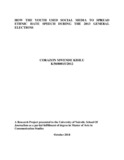| dc.description.abstract | In today‟s age of timeliness and demand for information, social media has continued to play a
crucial role in informing the public about politics, campaigns and elections. But while the public
demands information from the media, there is also an underlying cynicism in the world culture
against the media and politicians for negative campaign coverage and a perceived media bias.
The main aim of this research was to show how the youth used social media to promote ethnic
hate speech during the 2013 general elections in Kenya.
From a historical perspective, ethnicised politics in Kenya can be traced from Kenya‟s colonial
past. Ethnicity significantly informed the formation of the first national political parties in Kenya
which led to the country‟s independence in 1963 (Wanyama, 2010, p. 65). With the growth of
social media use among the youth in Kenya, many have taken to this platform to use it as a way
to share information. The researcher found out that in the 2013 general elections, facebook and
twitter played a vital role among the youth in influencing different political ideologies. This
trend of using social media to share information, mobilize and even have an impact to the society
is not only a Kenyan thing but a worldwide thing. Proponents of the democratizing power of
social media ( Jeong-su, 2003; Papacharissi, 2004; 2002; Woo-Young, 2005), profess the social
media‟s capacity to empower ordinary people to beat „big media‟ in the agenda setting scene.
Such enthusiasts argue that new media in general and social media in particular will increase
political participation and pave the way for a new democratic utopia. The successful use of social
media platforms such as Face Book, Twitter, MySpace and YouTube in mobilizing political
support in developed democracies such as the US by Barrack Obama in 2008 and 2012 and
David Cameron in the UK in 2010 as well as the political uprising in the Arab world popularly
known as the Arab Spring in Egypt, Tunisia and Libya ignited and catalysed by social media
among others has re-ignited debates about the power of new media in political mobilization
(Maweu 2013) | en_US |

